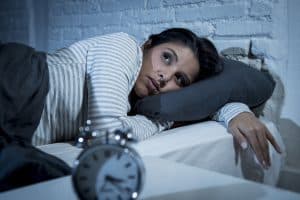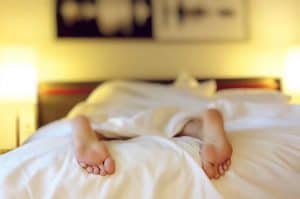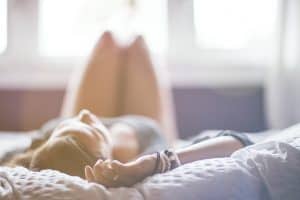
Everybody needs sleep. But did you know that a lack of proper sleep can increase the risk of diabetes and other risks? Having good sleep habits is also known as sleep hygiene.
The Physical Effects of Not Getting Enough Sleep
You probably know that if you miss too much sleep you feel tired the next day. That’s obvious, but what is less obvious is the impact on your hormonal systems that can also occur.
Increased Risk of Type 2 Diabetes

If you are chronically missing too much sleep, you are raising your risk for Type 2 Diabetes. How does this happen? Through research, it has been shown that not getting enough sleep (for example only 4 hours a night or even as much as 6.5 hours per night) causes your body to not release as much insulin (that hormone that regulates blood sugar) in your blood stream after you eat. Additionally, increased levels of cortisol (a stress hormone) will further limit your bodies ability to process blood sugar. Luckily, these effects can be easily reversed by returning to a regular, healthy sleep schedule.
A recent study found that shorter sleep duration is associated with childhood obesity. Longer sleep duration and greater sleep efficiency were also favorably associated with a trimmer waist line, normal blood pressure levels, and cholesterol levels.
Increased appetite
Similarly, the appetite regulating hormones – ghrelin and leptin – are also affected by sleep. When you are sleep-deprived, ghrelin levels are higher, leptin is lower, and this leads to an increase in hunger.
The second factor is that while you are awake longer, there’s more time to eat. Research has shown that people who get less than 8 hours of sleep may eat up to 300 more calories than someone getting the recommended sleep amount. Think of a long sleep as an overnight fast.
Tiredness Makes You Less Likely To Exercise
When you are chronically tired, you’re more likely to hit the couch and watch TV, rather than exercise or perform tasks requiring physical activity. This has an obvious impact on your waistline.
Sleep Apnea Can Bring Even Greater Health Risks
Something known as sleep apnea can bring even greater health risks. Sleep apnea is a sleep disorder in which breathing is briefly and repeatedly interrupted during sleep. Obstructive sleep apnea occurs when the muscles in the back of the throat fail to keep the airway open, despite efforts to breathe.
Sleep apnea can cause fragmented sleep and low blood oxygen levels. For people with sleep apnea, the combination of disturbed sleep and oxygen starvation may lead to hypertension, heart disease and mood and memory problems. Sleep apnea also increases the risk of drowsy driving.
Sleep apnea is a serious issue, and you should consult a physician if you are experiencing it.

How Much Sleep Should You Be Getting?
Thanks to the National Sleep Foundation, we have sleep recommendations developed by experts.
And you might’ve guessed – they vary with your age.
Still, to account for some individual differences, there is a recommended range and a range that may be appropriate, based on your individual situation:
| Age | Recommended Hours of Sleep | May Be Appropriate |
|---|---|---|
| Older Adult (Over 65 years in age) | 7-8 | 5-9 |
| Adult (26-64 years) | 7-9 | 6-10 |
| Young Adult (18-25 years) | 7-9 | 6-11 |
| Teenager (14-17 years) | 8-10 | 7-11 |
| School Age (6-13 years) | 9-11 | 7-12 |
| Preschool (3-5 years) | 10-13 | 8-14 |
| Toddler (1-2 years) | 11-14 | 9-16 |
| Infant (4-11 months) | 12-15 | 10-18 |
| Newborn (0-3 months) | 14-17 | 11-19 |
Tips for Better Sleep
These tips for better sleep should work for anyone who has issues falling asleep, or staying asleep:
- Keep your bedroom dark. Eliminate sources of light from outside, as well as inside the room. Ditch all electronics with their ever-present glow.
- Keep the bedroom cool and well-ventilated. Stay cool – Wear loose, comfortable clothing to bed. Ideal temperature is about 69 degrees Fahrenheit. Use a ceiling fan, on a slow setting.
- Avoid excessive physical activity prior to sleep – Of course you should exercise regularly but a vigorous workout immediately prior to sleep will likely delay your ability to drift off. Keep to workouts in the late afternoon, or early evening, if possible. Regular exercise may help you sleep better – just keep it to earlier in the day.
- Avoid food and heavy meals right before bedtime. This can help to avoid acid reflux and other digestion difficulties that interfere with sleep. Avoid foods that may trigger indigestion – such as spicy foods, carbonated drinks, and citrus fruits.
- Before bedtime, try snacks high in tryptophan – such as dried dates, nuts, bananas and yogurt. Tryptophan, an essential amino acid, can induce drowsiness. Contrary to popular belief turkey only contains average amounts of tryptophan. A snack relatively high in carbohydrates will raise insulin levels, and ultimately cause drowsiness as well (don’t go overboard with this tip!)
- Caffeine, alcohol and nicotine, which are all stimulants, can make it difficult to fall asleep or to stay asleep. Caffeine can be handled differently by the body and you may need to avoid caffeine in the late afternoon and evening, depending on how your body handles it. Alcohol can disrupt sleep in the second half of the night, as your body processes the alcohol.
- Naps during the day can prevent you from falling asleep promptly at bedtime. Limit naps to 20-30 minutes.
- Limit noise as much as possible or use a “white noise” generator to mask background noise – this is a great tip for travel too. Not sure what white noise sounds like? Before you buy, try this great online white noise generator for free. This option works particularly well in hotel rooms while traveling.
- Limit outdoor light through the use of heavy curtains or blinds. Many electronic devices have a non-stop status or power light that can introduce a surprising amount of illumination in the room. Put your smartphone screen down, so it doesn’t light up constantly through the evening. Eye shades and ear plugs may be helpful as well.
- Relaxation, deep breathing, or other ways of coping with stress can help to decrease feelings of anxiety and depression, which can interfere with sleep
- Reading before bed helps many fall asleep – it helps take your mind off the activities and stresses of the day.
- Going to sleep at a similar time each night allows the body to anticipate and prepare for bedtime. Developing a relaxing ritual before sleep may help as well.

A White Noise Machine can make a huge difference in your sleep quality – for both falling asleep and staying asleep. These devices are especially helpful in noisy environments (hotels, apartments, etc.) You can use the online noise generator we linked to earlier in the article, but having a laptop or computer in the bedroom is not an ideal situation either.
Therefore, we recommend the LectroFan High Fidelity White Noise Machine (Buy on Amazon). It’s compact, easy to use, and has many options.
- Provides ten fan sounds and ten ambient noise variations, including white noise, pink noise and brown noise
- Helps mask disruptive environmental noises so you or your little one can fall asleep with ease
- Safe, solid-state design is powered by AC or USB and dynamically creates unique, non-repeating sounds with no moving parts
- Precise volume control allows you to set the perfect level for your unique environment
- Also ideal for creating a disturbance-free work area, or just reducing the distracting effect of outside noises for a more relaxing environment, day or night
References
- Elizabeth M. Cespedes Feliciano, Mirja Quante, Sheryl L. Rifas-Shiman, Susan Redline, Emily Oken, Elsie M. Taveras, Objective Sleep Characteristics and Cardiometabolic Health in Young Adolescents, Pediatrics Jun 2018, e20174085; DOI: 10.1542/peds.2017-4085
- Paruthi S, Brooks LJ, D’Ambrosio C, Hall WA, Kotagal S, Lloyd RM, Malow BA, Maski K, Nichols C, Quan SF, Rosen CL, Troester MM, Wise
MS. Recommended amount of sleep for pediatric populations: a consensus statement of the American Academy of Sleep Medicine. J Clin Sleep Med 2016;12(6):785–786.
Photo credits
Sleep images: via pexels.com
Product photos courtesy of the manufacturer.

Tim is the founder of FitAtMidlife.com – an avid gym rat for 30+ years, he’s a reviewer of many, many shoes – and founder of the Speed Bag Gathering – the world’s only gathering of speed bag punching enthusiasts. See more gym reviews at Tim’s YouTube channel.




